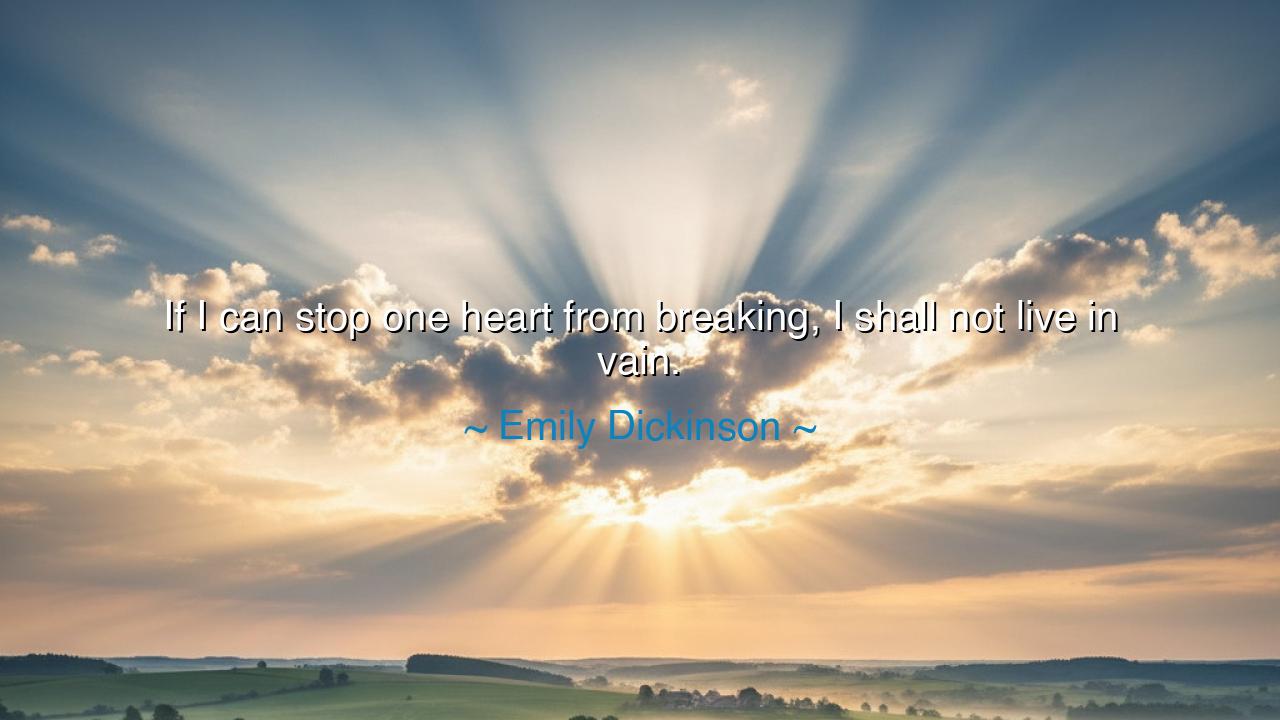
If I can stop one heart from breaking, I shall not live in vain.






The words of Emily Dickinson rise with quiet yet eternal power: “If I can stop one heart from breaking, I shall not live in vain.” In this single line, the poet of Amherst distills the purpose of existence into the gentlest of acts—easing another’s sorrow, preventing another’s despair. She does not speak of conquering kingdoms or writing volumes of philosophy; she speaks of mercy, of tenderness, of compassion. To live meaningfully, she declares, is not to achieve greatness in the eyes of the world, but to preserve even one fragile heart from shattering.
This vision reflects the wisdom of the ancients, who taught that the worth of life is measured not in wealth or glory, but in service. The Stoics said, “What is not good for the hive is not good for the bee,” teaching that the health of one depends on the care of all. Dickinson, in her own way, echoes this eternal law: our lives are not in vain if they bring solace to even a single soul. To stop one heart from breaking is to shift the balance of the world, for in every spared sorrow lies the seed of hope.
History gives us shining examples of this truth. Consider Florence Nightingale, who in the midst of war tended to the sick and dying with tireless devotion. She could not stop every heart from breaking, nor could she save every soldier. But in saving some, in comforting many, she found the immortality of purpose. She proved that a life dedicated to compassion, even in small gestures, is a life never lived in vain. Dickinson’s words find flesh in such deeds—quiet acts of mercy that echo louder than armies.
The line also reveals Dickinson’s humility. She does not aspire to heal the entire world, only to ease one sorrow. In this she teaches us that greatness lies not in scale but in sincerity. Too often, people despair because they cannot do everything, forgetting that even doing one thing—saving one heart from breaking—is immeasurable in worth. The ancients compared this to planting a tree: one may not shelter all mankind, but the one who rests in its shade will bless the hand that planted it.
Her words also pierce with urgency, reminding us of life’s brevity. To not live in vain is the deepest yearning of every soul—to know that one’s days were not wasted, that something of value was left behind. Dickinson insists that value is not found in monuments, but in compassion. Even if no one remembers your name, if one heart beats with less sorrow because of you, then your existence has been justified before eternity.
The lesson here is profound: do not wait for grandeur; act in tenderness. Stop one heart from breaking, even if it is by listening, by speaking kindness, by bearing another’s burden in silence. Save a single soul from despair, and your life will be crowned with meaning. Do not despise small mercies, for they are greater than empty triumphs. Compassion is the true monument of the human spirit.
Therefore, let all who hear these words take action: seek out the hearts around you. Ask who is breaking, who is weary, who is in need of even a small light in their darkness. Be the one to offer it. For in so doing, you too may echo Dickinson’s vow—that your life, however humble, will not be lived in vain.
Thus her words endure, like a whisper carried on the winds of time: the measure of a life is not in its fame, but in its kindness. And if you can stop one heart from breaking, then your life has already touched eternity.






AAdministratorAdministrator
Welcome, honored guests. Please leave a comment, we will respond soon